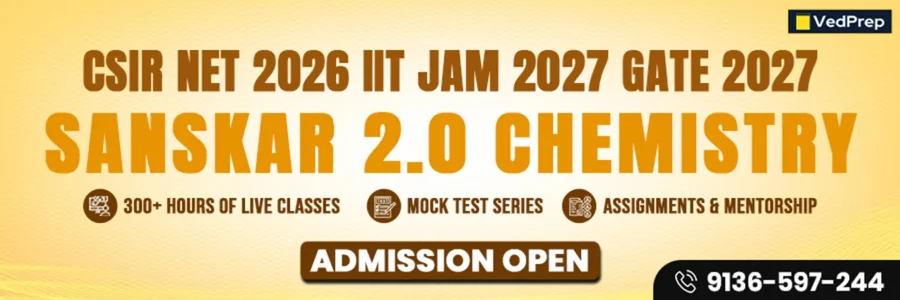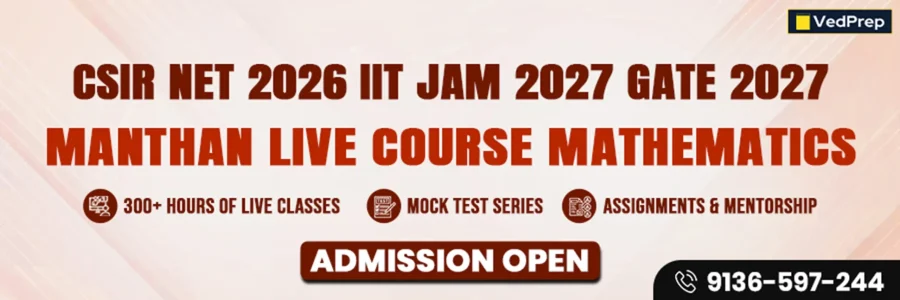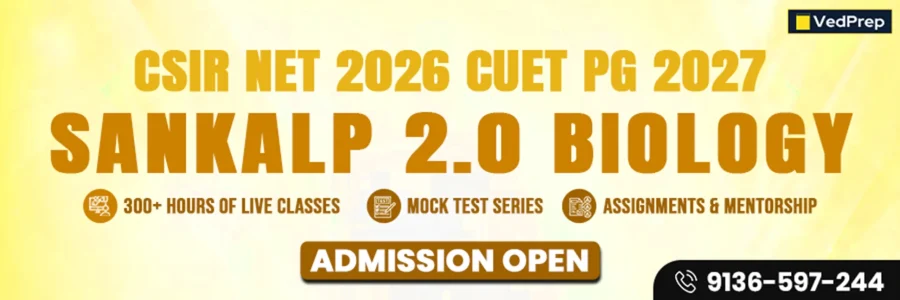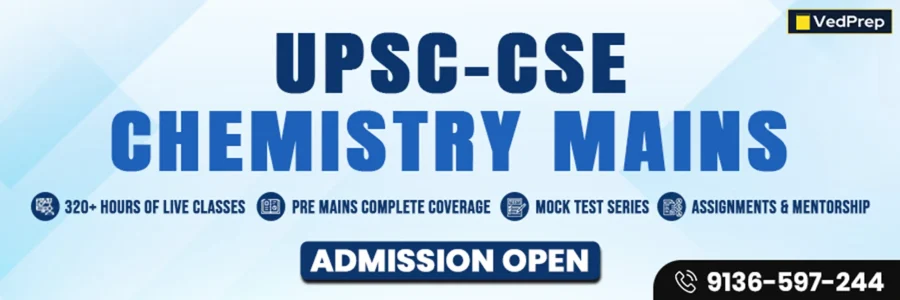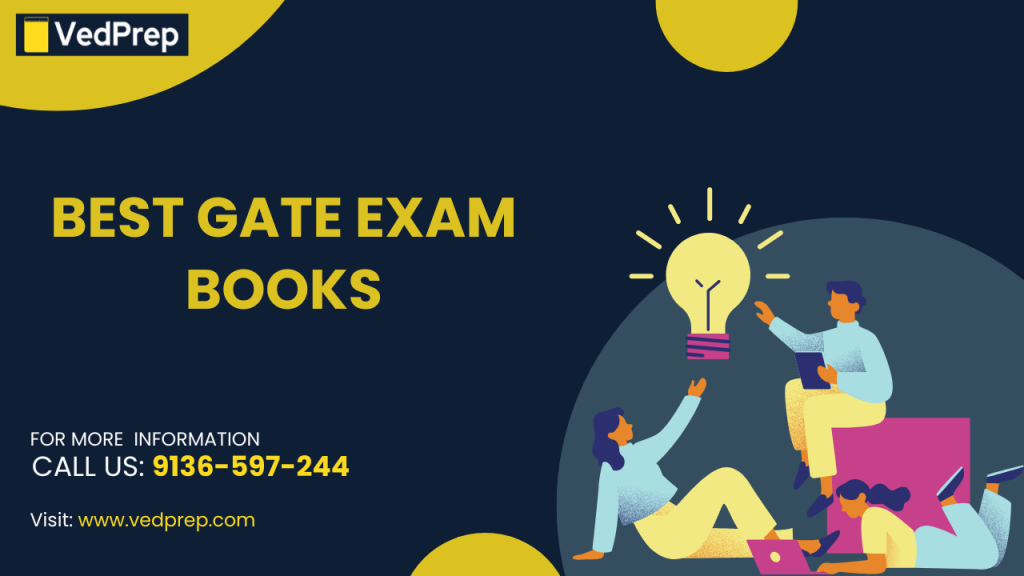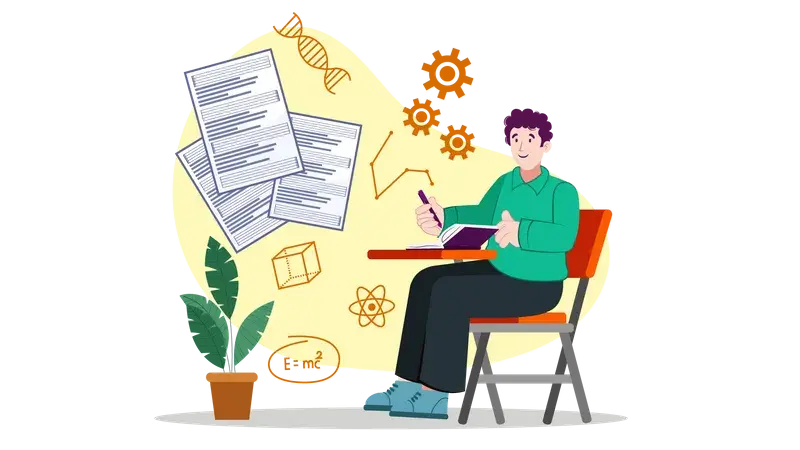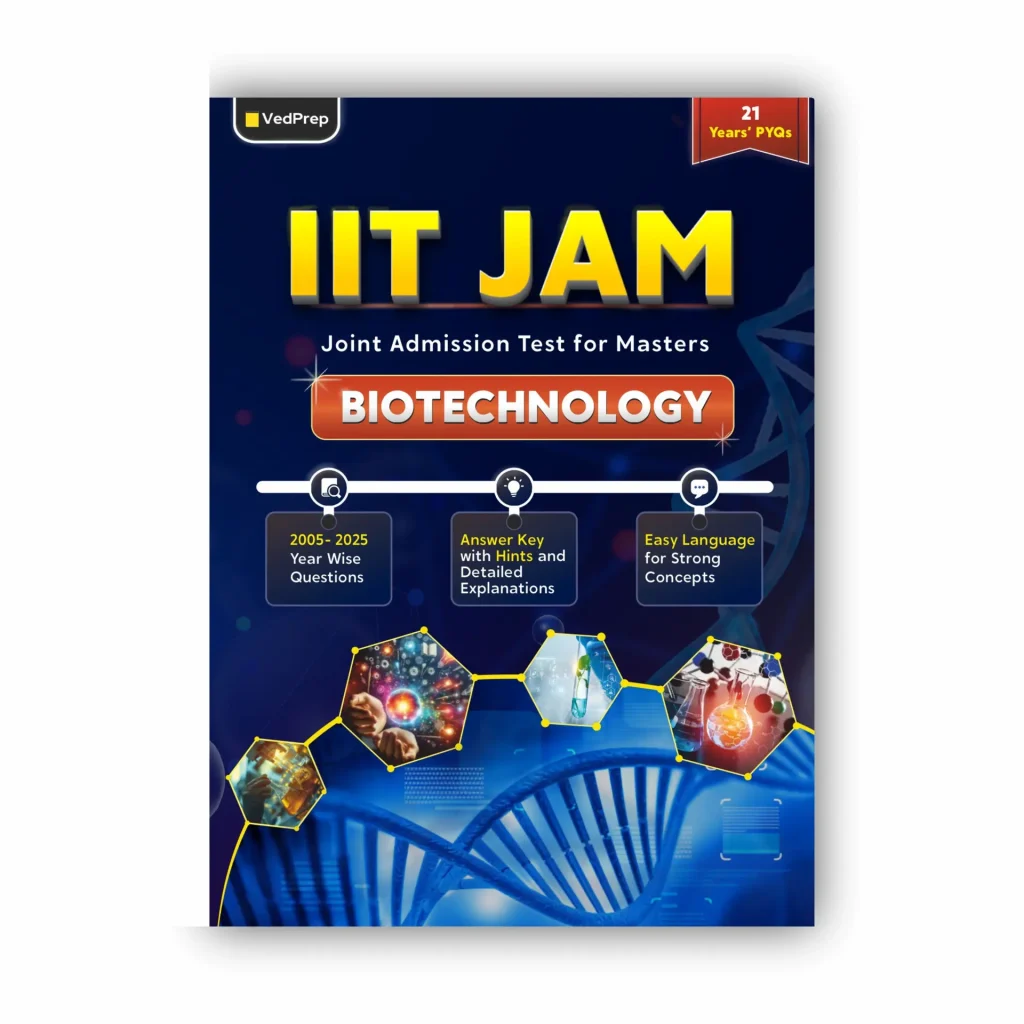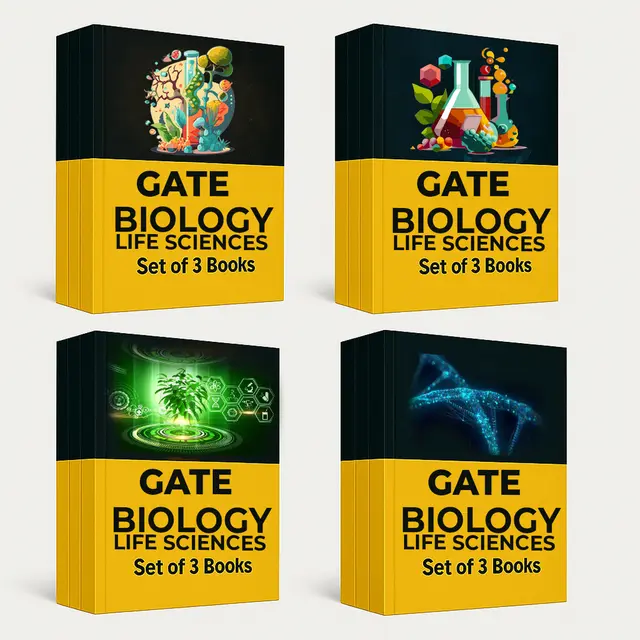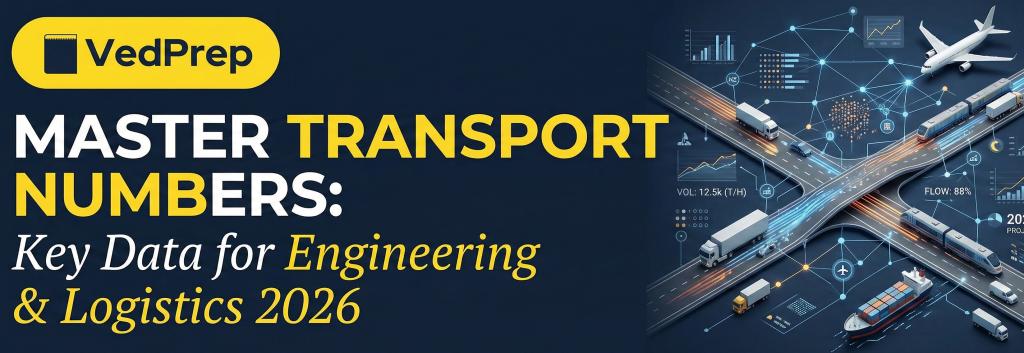GATE Books play an important role in GATE Exam preparation. Graduate Aptitude Test in Engineering (GATE Exam) is a national-level exam held annually for admission to ME / M.Tech courses and PSUs recruitment. GATE is a highly competitive Exam, and it is important to have a good preparation strategy to secure high marks and a good score. GATE books act as a comprehensive study resource that ensures candidates’ high ranking in the GATE Exam. There are a lot of books available for GATE Exam preparation, but you have to choose the one that is referred to by the experts and that mostly covers all the topics in detail.
The best GATE books contain important topics, GATE’s previous year’s question papers, and a detailed paper pattern. By using GATE books, candidates can get detailed conceptual information and high-weightage topics.
Also, read the GATE Exam
GATE Books 2026 List Overview
With the help of best GATE books 2026, candidates will be able to study and understand the GATE Syllabus, topics, and chapters well and score well in the Examination. Many factors contribute to what the best GATE books are for GATE Exam 2026 preparation. We have provided a detailed table listing some of the best GATE books for preparation. These books cover various chapters and are highly recommended for GATE aspirants.
Also Read GATE PYQs
- Engineering Mathematics
- Advanced Engineering Mathematics – Erwin Kreyszig
- Higher Engineering Mathematics – B.S. Grewal
- Advanced Engineering Mathematics – R.K. Jain & S.R.K. Iyengar
- Probability and Statistics for Engineers – Richard A. Johnson
- General Aptitude
- A Modern Approach to Verbal and Non-Verbal Reasoning – R.S. Aggarwal
- Quantitative Aptitude for Competitive Examinations – R.S. Aggarwal
- Objective English – S.P. Bakshi
- Word Power Made Easy – Norman Lewis
- Core Concept Strengthening (Recommended Across Branches)
- Engineering Mechanics – S.S. Bhavikatti / R.C. Hibbeler
- Basic Electrical Engineering – D.P. Kothari & I.J. Nagrath
- Basic Electronics – Sedra & Smith / Millman & Halkias
- Computer Fundamentals – P.K. Sinha
- Thermodynamics: An Engineering Approach – Yunus A. Çengel & Michael A. Boles
- Problem-Solving and Practice Books
- GATE Tutor Series (Arihant Publications)
- GATE Guide by Made Easy / ACE Academy
- Previous Year GATE Question Papers with Solutions – G.K. Publications
- GATE 2025/2026 Practice Papers – Pearson / Wiley
- Reference Books for Concept Revision
- Objective Electrical Technology – V.K. Mehta & Rohit Mehta
- Objective Mechanical Engineering – R.K. Jain
- Objective Civil Engineering – S.P. Gupta & S.S. Gupta
- Objective Electronics and Telecommunication Engineering – G.K. Mithal
- Online and Supplementary Resources
- NPTEL Video Lectures (IIT Faculty)
- Made Easy & ACE Engineering Academy Study Materials
- GATE PYQs & Mock Tests (Official GATE Website & Coaching Portals)
GATE Books 2026 for Computer Science Engineering(CSE)
Detailed sectional and topic-wise best GATE Books 2026 for Computer Science in Engineering(CSE) are given in the table below
| Section | Topic | Books | Author |
| Digital Logic
|
Boolean algebra.
Combinational and sequential circuits |
Digital logic and computer design | M. Morris Mano |
| Modern digital electronics | R.P. Jain | ||
| Computer Organisation and Architecture | Machine instructions ALU
Memory hierarchy I/O interface |
Computer Organisation and Architecture | William Stallings |
| Computer organization | Carl Hamacher | ||
| Programming and Data Structures | Programming in C | The C programming language
|
Dennis M.Ritchie |
| C: The complete reference | Herbert Schildt | ||
| Data Structure
|
Fundamentals of data structure | Sartaj Sahni | |
| Data structures and algorithms MADE EASY | Narasimha Karumanchi | ||
| Algorithms | Algorithm design techniques
Dynamic programming |
Introduction to Algorithms | Thomas H.Cormen |
| Fundamentals of computer algorithms | Rajasekaran, Sahni, Horowitz | ||
| Theory of Computation | Regular expressions and finite automata
Turing machines and undecidability |
An introduction to formal languages and automata | Peter Linz |
| Automata theory, languages, and computation | John E Hopcroft, Jeffrey D. Ullman | ||
| Compiler Design | Lexical & liveness analysis
Intermediate code generation |
Compilers’ principles, techniques, and tools | Alfred Aho and Jeffrey Ullman |
| Principles of Compiler Design | Alfred Aho and Jeffrey Ullman | ||
| Databases
|
ER-model
Relational model SQL |
Database System Concepts | Henry Korth |
| Fundamentals of Database Systems | Elmasri Navathe | ||
| Computer Networks | Concept of layering
Fragmentation and IP addressing |
Data communication and networking | Behrouz A. Forouzon |
| Computer networks | Andrew S. Tanenbaum,
David J. Wetherall |
GATE Books 2026 for Mechanical Engineering (ME)
Detailed sectional and topic-wise best GATE Books 2026 for Mechanical Engineering(ME) are given in the table below
| Section | Topics | Book | Author |
| Applied Mechanics and Design | Engineering Mechanics | Engineering Mechanics- New Age International | S S Bhavikatti |
| An Introduction to Mechanics | Daniel Kleppner and Robert Kolenkow | ||
| Mechanics of Materials | Strength of Materials | Timoshenko & Gere | |
| Mechanics of Materials | RC Hibbeler | ||
| Theory of Machines | The Theory of Machines | SS Ratan | |
| Vibrations | Mechanical Vibrations | G K Grover | |
| Machine Design | Designs of Machine Elements | VB Bhandari | |
| Fluid Mechanics | Fluid Mechanics | A Textbook of Fluid Mechanics and Hydraulic Machines | RK Bansal |
| Fluid Mechanics | Frank White | ||
| 1000 Solved Problems in Fluid Mechanics | K Subramanya | ||
|
Thermal sciences |
Heat Transfer | Heat & Mass Transfer | JP Holman & S Bhattacharyya |
| Thermodynamics | Engineering Thermodynamics | P.K. Nag | |
| Thermodynamics: An Engineering Approach
|
Yunus A. Cengel, Michael A. Boles | ||
| Applications of Thermodynamics | Refrigeration & Air Conditioning | C.P. ARORA | |
| Internal Combustion Engines | V. Ganesan | ||
| Power Plant Engineering | P.K. Nag | ||
| Materials, Manufacturing, and Industrial Engineering | Engineering Materials
Casting, Forming, and Joining Processes |
Material Science and Metallurgy | OP Khanna |
| Callister’s Materials Science and Engineering
|
R. Balasubramaniam
|
||
| Machining and Machine Tool Operations
Metrology and Inspection Computer-Integrated Manufacturing Production Planning and Control Inventory Control Operations Research |
Industrial Engineering and Management | O. P. Khanna
|
|
| Industrial Engineering and Organisation Management | S. K. Sharma
Savita Sharma
|
||
| Industrial Engineering and Production Management | Telsang Martand |
GATE Books 2026 for Biotechnology(BT)
Detailed sectional and topic-wise best GATE Books 2026 for BT(Biotechnology) is given in the table below
| Section | Book | Author |
| Biochemistry | Lehninger Principles of Biochemistry | Nelson and Cox |
| Microbiology | Prescott’s Microbiology | Willey, Sherwood, and Woolverton |
| Genetics, Cellular, and Molecular Biology | Principles of Genetics | Gardner |
| Molecular Biology of the Gene | Watson | |
| Principles of Gene Manipulation and Genomics | Primrose | |
| Immunology | Kuby Immunology | Kindt, Goldsby, and Osborne |
| Bioprocess Engineering and Process Biotechnology | Bioprocess Engineering | Pauline M. Doran |
| Plant, Animal, and Microbial Biotechnology | Plant Biotechnology | Chawala |
| animal and microbial biotechnology | Freshney and Prescott | |
| Recombinant DNA technology and other tools in Biotechnology | Gene Cloning and DNA Analysis | T.A. Brown |
GATE Books 2026 for Electrical Engineering(EE)
The detailed sectional and topic-wise best GATE Books 2926 for Electrical Engineering(EE) is given in the table below
| Section | Topics | Book | Author |
| Electric circuits | Network Elements
DC and AC networks |
Fundamentals of Electric Circuits | Charles. K. Alexander |
| Engineering Circuit Analysis | WH Hayt, SM Durbin | ||
| Circuit Theory: Analysis & Synthesis | Abhijit Chakraborti | ||
| Electromagnetic Fields | Electromagnetism
EM Waves Induction |
Engineering Electromagnetics | W H Hayt, John A Buck |
| Electromagnetic Waves and Radiating Systems | Edward C. Jordan, Keith G. Balmain | ||
| Signals and Systems | LTI Systems
Z-Transform and Laplace Transform Fourier Representation of Signals |
Signals And Systems | Oppenheim Alan V, W Alan, NS Hamid |
| Signals and Systems | A. Anand Kumar | ||
| Signals and Systems | Simon Haykin, Barry Van Veen | ||
| Electrical Machines | Transformer
AC-DC Machines Motors |
Electric Machinery Fundamentals | Stephen J. Chapman |
| Electric Machinery | P.S. Bimbhra | ||
| Electric Machinery | Fitzgerald and Kingsley | ||
| Power Systems | Power Generation Concepts
Load Flow Methods, Bus Impedance and Admittance Matrices Symmetrical and unsymmetrical fault analysis System stability concepts |
Elements of Power System Analysis | William D Stevenson |
| Electrical Power Systems | C.L. Wadhwa | ||
| Electrical Power Systems by | Ashfaq Hussian | ||
| Power System Engineering | D.P. Kothari and J. Nagrath | ||
| Control Systems
|
Feedback principle
Linear time-invariant systems Nyquist and Bode Plots P, PI & PID controllers Routh-Hurwitz Criteria |
Control Systems Engineering | I.J. Nagrath, M. Gopal |
| Automatic Control Systems | B.C. kuo, Farid Golnaraghi | ||
| Modern Control Engineering | Katsuhiko Ogata | ||
| Principles of linear systems and signals | BP Lath | ||
| Electrical and Electronic Measurements | Bridges and Potentiometers
Measurement |
Electrical and Electronic Measurements and Instrumentation | AK Shawhey
|
| Modern Electronic Instrumentation and Measurement Technique | AD Helfrick
William D. Cooper
|
||
| Analogue and Digital Electronics | Amplifiers: characteristics and applications
Boolean Algebra and K-Map A/D and D/A converters Combinatorial and sequential logic circuits |
Integrated Electronics | Jacob Millman Christos C Halkias |
| Digital Logic and Computer Design | M Morris Mano | ||
| Electronic Devices and Circuits | Robert L. Boylestad Louis Nashelsky | ||
| Power Electronics | Characteristics of Semiconductor Devices
Rectifiers Principles of Choppers Principles of Inverters |
Power Electronics | P.S. Bimbhra |
| Devices, Circuits, and Applications | Muhammad H. Rashid |
GATE Books 2026 for Aerospace Engineering(AE)
The detailed sectional and topic-wise best GATE Books 2026 for Aerospace Engineering(AE) are given in the table below
| Section | Topics | Book | Author |
| Aerodynamics | Basic Fluid Mechanics
Measurement and Visualisation Techniques Compressible Flows |
Fundamentals of Aerodynamics | John D. Anderson, Jr |
| Aerodynamics of Engineering Students | E.L. Houghton, P.W. Carpenter | ||
| Gas Dynamics | E. Radhakrishnan | ||
| Flight Mechanics | Airplane performance
Static Stability |
Aircraft Performance and Design | John D. Anderson, Jr |
| Introduction to Flight | John D. Anderson, Jr | ||
| Airplane Performance, Stability, and Control | Perkins and Hage | ||
| Propulsion | Turbomachinery
Axial Turbines Aerothermodynamics of aircraft engines |
Mechanics and Thermodynamics of Propulsion | Hill & Peterson |
| Gas Turbines | V Ganesan | ||
| Elements of Rocket Propulsion | George P. Sutton | ||
| Engineering Mathematics | Linear Algebra
Calculus Differential Equations Complex Analysis |
Advanced Engineering Mathematics | Erwin Kreyszig |
| Advanced Engineering Mathematics | HK Dass | ||
| Advanced Engineering Mathematics | RK Jain, SRK Iyengar | ||
| Structures | Strength of Materials
Structural Dynamics |
A Textbook of Strength of Materials | RK Bansal |
| Strength of Materials | Stephen Timoshenko | ||
| Aircraft Structures for Engineering Students | THG Megson |
GATE Books 2026 for Electronics and Communication Engineering(ECE)
The detailed sectional and topic-wise best GATE Books 2026 for Electronics and Communication Engineering(ECE) are given in the table below
| Section | Topic | Books | Author |
| Networks, Signals, and Systems | Circuit Analysis
Continuous-time Signals Discrete-time Signals |
Fundamentals of Electric Circuits | Charles K. Alexander & Matthew N.O. Sadiku |
| Engineering Circuit Analysis | William H. Hayt
|
||
| Network Analysis | Mac Van Valkenburg | ||
| Electronic Devices | Intrinsic and extrinsic semiconductors
Carrier Transport P-N junction |
Semiconductor Physics and Devices | Donald A. Neaman & Dhrubes Biswas |
| Solid State Electronic Devices | Ben G. Streetman and Sanjay Banerjee | ||
| Semiconductor Devices | S. M. Sze | ||
| Analog Circuits
|
Diode Circuits
BJT and MOSFET Amplifiers Op-amp Circuits |
Integrated Electronics
|
Jacob Millman Christos C Halkias |
| Electronic Devices and Circuits | Robert L. Boylestad Louis Nashelsky | ||
| Microelectronics circuit | Sedra & Smith | ||
| Digital Circuits
|
Number Representations
Sequential Circuits Data Converters Semiconductor Memories Computer Organization |
Digital Electronic Principles and Applications | Ronald J. Toccii |
| Digital Logic and Computer Design | M Morris Mano | ||
| Modern Digital Electronics | R.P. Jain | ||
| Control Systems | Feedback principle
Linear time-invariant systems Nyquist and Bode Plots P, PI & PID controllers Routh-Hurwitz Criteria |
Control Systems Engineering | I.J. Nagrath, M. Gopal |
| Automatic Control Systems | B.C. kuo, Farid Golnaraghi | ||
| Modern Control Engineering | Katsuhiko Ogata | ||
| Principles of linear systems and signals | BP Lath | ||
| Communications | Random Processes
Analog Communications Information Theory Digital Communications |
Analog and Digital Communication Systems | Simon Haykin
|
| Principles of Communication Systems
|
Taub& Schillings | ||
| Modern digital and analogue communication systems | BP Lathi
|
||
| Electromagnetics | Maxwell’s Equations
Plane Waves and Properties Transmission Lines |
Principles of Electromagnetics | Matthew N.D. Sadiku &
S.V. Kulkarni |
| Elements of Electromagnetics | Matthew N.O. Sadiku | ||
| Engineering Electromagnetics | William Hayt |
Benefits of Best GATE Books During Preparation
While selecting the best GATE books for preparation, make sure to follow some important points during the selection of GATE Books. The following points should be followed while deciding the best GATE books for preparation.
Easy to understand
The language should be easy and understand easily which will help to understand the concepts and problems to candidates easily. This will allow students to gain a deeper understanding of the GATE Syllabus.
Concise explanation
Since the GATE question papers are complicated, books should have to explain in a simple and concise form. The explanation should be concise, crisp, and easy to understand.
Accurate information
The books we are following for the GATE Exam preparation should have accurate information about the syllabus and be based on the exam pattern. Candidates have to avoid such books that are misleading; otherwise, in such cases, a big loss may be faced.
Pictorial Representation
Pictorial representation enhances the chances of remembering any content easily. Candidates prefer those GATE books that contain descriptive diagrams and suitable pictorial pages in a summary way.
Avoid Fancy Languages
During the preparation, candidates have to prefer simple language books and have to avoid tough or unfamiliar languages. These languages will create a high risk of misunderstanding and will cause confusion.
Also, Read the GATE Syllabus
Factors Affecting GATE Preparation Along With Best GATE Books
Some factors matter a lot during the GATE Exam preparation, along with the best GATE books, and have a high chance of affecting your score as well as your rankings. Some important factors are given below that will affect your GATE Exam 2026 preparation
GATE Syllabus 2026
Candidates must be familiar with the updated GATE Syllabus 2026 before commencing to prepare for the exam. GATE syllabus will help to understand the topic and make a good strategy for Exam Preparation. With the help of the syllabus, they will be aware of the topics and can prepare according to the topics and chapters.
GATE Exam Pattern 2026
During the preparation for the GATE Exam, being familiar with the GATE Exam Pattern 2026 will boost your ranking and help you to know the weightage of mark distribution topic-wise. GATE Exam Pattern will help in understanding the type of Questions asked, marking scheme, number of questions, sectional mark distribution, and more. This will make candidates understand the GATE Exam 2026 and be well prepared.
GATE Previous Year Question Papers
One of the best ways to prepare GATE Exam is to solve GATE previous year’s question papers for at least 5 years and attempt mock tests. This will allow candidates to practice whatever they have studied and make them comfortable with the Exam level. After practising GATE PYQs and attempting the GATE mock test, there is a low chance of making mistakes in the GATE Exam.
GATE Books 2026 FAQs
Why GATE Books are necessary For GATE Exam preparation?
GATE books help to improve practice questions, revise the syllabus, and target a scheduled study plan. They provide us with the idea of abo upcoming questions in the exam.
Can I be admitted to IIAEIT with the GATE scorecard?
Yes, of course, you can be admitted to IIAEIT(Indian Institute for Aeronautical Engineering and Information Technology) with the GATE scorecard because IIAEIT shares the result with GATE.
Is solving GATE PYQs beneficial?
Of course, solving GATE PYQS will be beneficial for you. It will help to improve your mistakes during problem-solving and will give an idea about the level required in the GATE Exam
When GATE 2026 registration form be released?
The GATE 2026 registration form may be released in the last week of August 2025. The GATE 2026 exam will be conducted by IIT Guwahati.
Can we apply for two papers in the GATE Exam?
Yes, by the subject combination, you may apply for two subjects, and you have to pay some charge, I guess double the single one, and you will appear for two papers in the exam.

